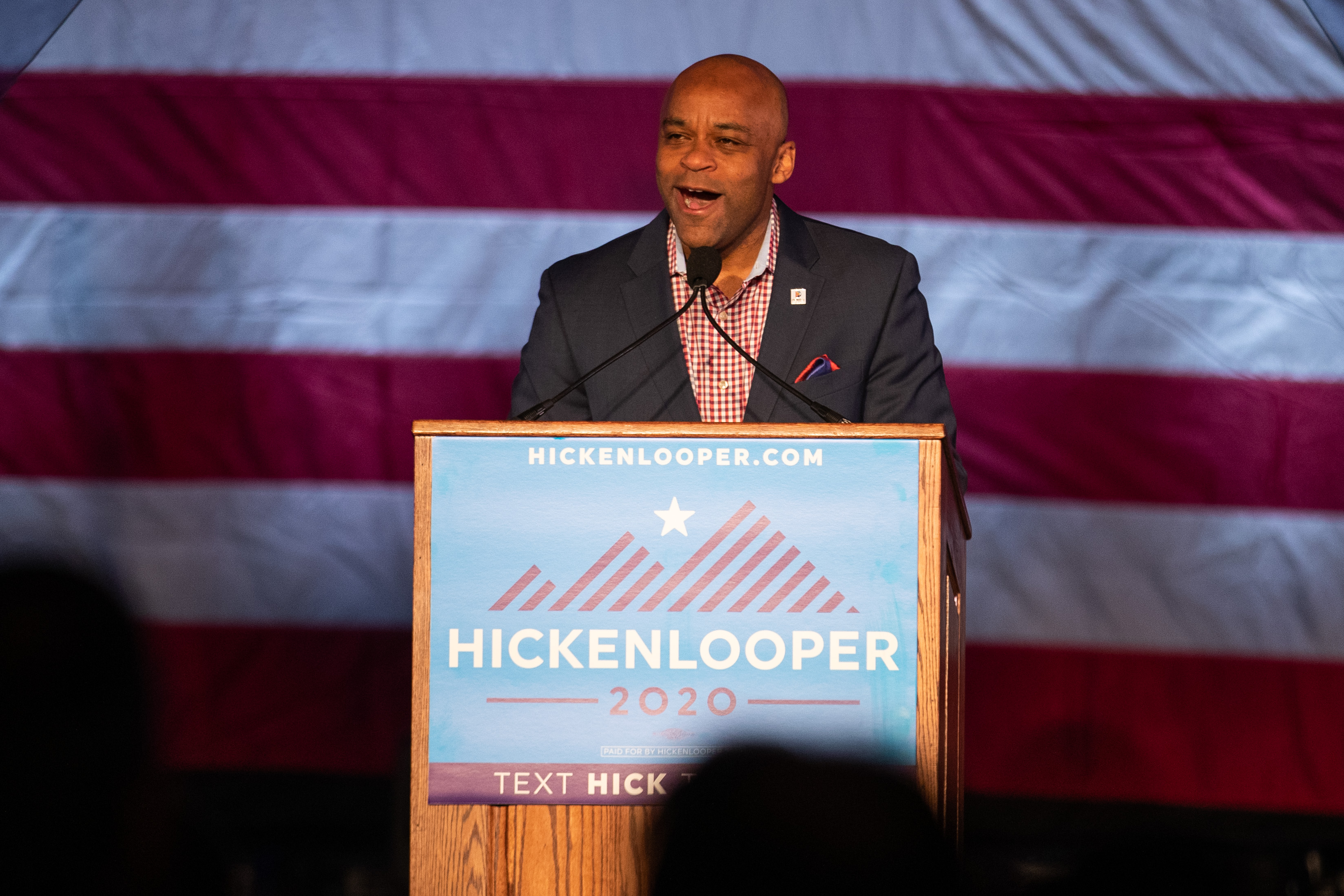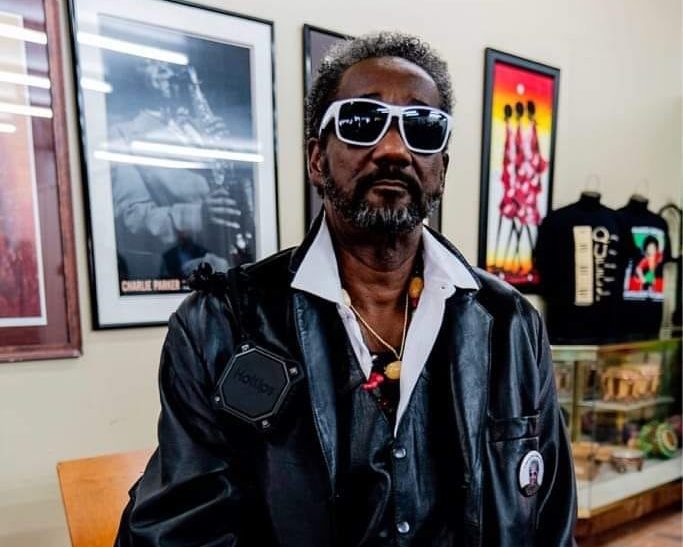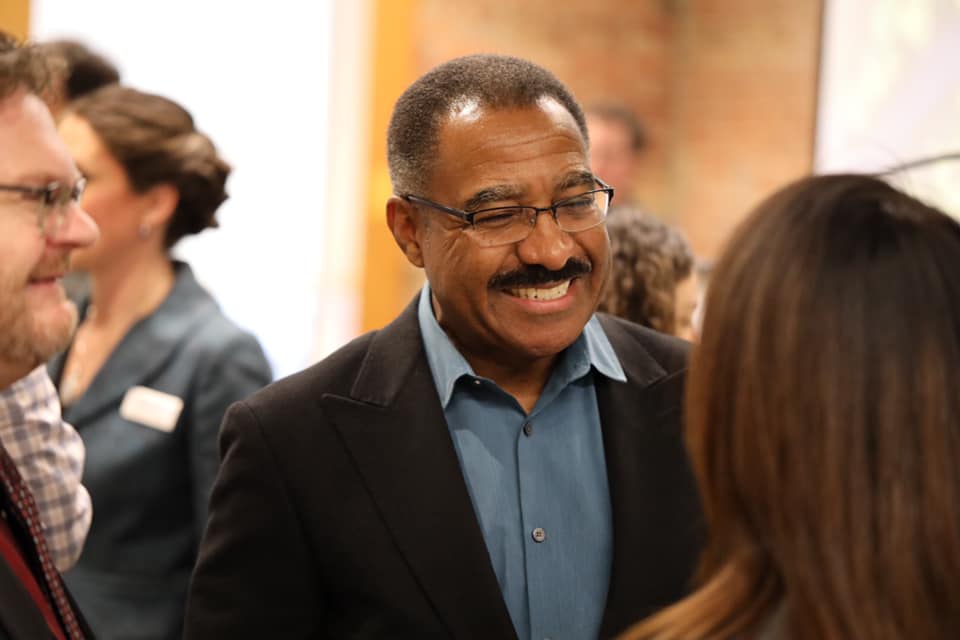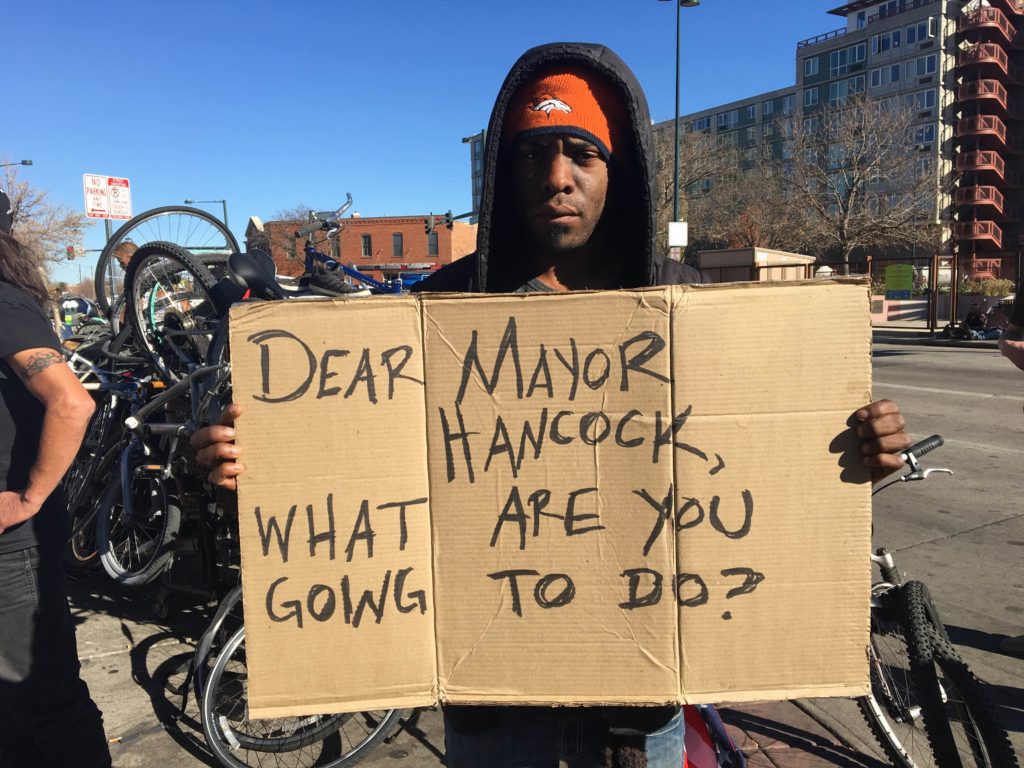Unlike November elections, this forthcoming vote in May might have less awareness in the general public. But for those living in Denver, it’s more important than ever to cast your vote. That’s because we’re electing our city’s leaders — both for mayor and the influential seats in City Council. For this guide, we’re focusing on the hot mayoral race as well as the handful of initiatives on this year’s ballot. Read on to get a look at the players and what they stand for before you cast your vote on May 7.
Candidates for Mayor
There are six main candidates running for mayor, including the incumbent Michael Hancock, plus an additional four write-ins who will appear on the ballot. Since the last election in 2015, when Mayor Hancock won virtually unopposed (the opposer Marcus Giavanni received just over eight percent of the vote), the political climate has changed. Not only has that been felt on a national scale, but also in Denver, where a few contentious topics are steering the race. For the most part, the candidates are zeroed in on growth and gentrification, homelessness and (to use a phrase we’ve all come to grind our teeth at) “draining the swamp” of city government.
It’s also important to note that, if no one garners more than 50% of the vote (for any race), there will be a runoff vote on June 4 between the top two vote-getters.
Michael Hancock (incumbent)

Party: Nonpartisan (registered Democrat)
Background/Experience: Incumbent Mayor Michael Hancock grew up in Denver public housing, raised by a single mother along with nine other kids. He was first sworn in back in 2011, then reelected in 2015. Before that, he served as City Councilman for District 11 for eight years. Hancock holds decades of experience in the inner workings of Denver, through his time at the Denver Housing Authority, the Metro Denver Urban League and in the City Council. He was the youngest president of any Metro Urban League in the country at age 29, and was elected as a City Councilman five years later. He’s made more than a few headlines during his tenure as Mayor and in his other offices — although the ones in recent years have certainly hurt his reputation more than the ones in his early years of public office. One of the major criticisms of Hancock as Mayor started in 2012 when he helped pass the unauthorized camping bill. Tensions from that bill, which many opponents claimed criminalized the homeless, came to a head in 2016 when the homeless “sweeps” were broadcast online.
Platform: Hancock asserts that during his two terms as Mayor, the economic vitality of Denver has prospered more than it would have without him. He sites statistics like the decreased unemployment rate, the number of new businesses in the city and perhaps most importantly, the affordable housing fund (worth $30 million each year). With the new election, Hancock understands the needs and demands of Denver citizens have changed since his first and second time in office. Consequently, he has turned his attention toward equity in the economic sectors rather than the bottom line of economic growth he was trying to achieve for the last seven years when Denver was coming out of a financial hangover. Much of his platform stands on the idea that Denver only succeeds when everyone in it succeeds — a goal he hopes to achieve with the affordable housing projects and fund, improving infrastructure and transportation and “modernizing city services” (a move that could save millions of taxpayer dollars).
Good to Know: If elected, Hancock would serve his third term as Denver’s mayor. So far, he has raised $1.5 million on his campaign and spent just over $1.3 million. These numbers catapult Hancock into a completely different realm than all the other candidates running for mayor combined. If that tells voters anything, it says that he still wants to prove he can steer Denver in a progressive way, without too many controversies. But, the looming presence of his past might be hard to ignore. First, the unauthorized camping bill ordeal, followed by the revealing of his suggestive text messages to Leslie Branch-Wise (a female member of his security detail) and topped off with the leaking of a video showing his son having a tantrum after getting pulled over by Aurora Police. The sexual harassment case with his subordinate ended in the city paying officer Branch-Wise $75,000.
Also read: Denver Post profile, Colorado Politics’s guide on his 20-year plan, CPR’s exposé on lobbyists and the city government
Jamie Giellis

Party: Nonpartisan (registered Democrat)
Background/Experience: Jaime Giellis was born in a rural town in Iowa to parents who were always involved in local politics. At 26, she was hired by Downtown Cedar Rapids to work on a revitalization plan, which launched her interest in city management and brought her to Colorado in 2006 to pursue a Masters in Public Administration at the University of Colorado Denver. After working at a consulting firm that focused on urban revitalization, she started her own consulting business in 2009 called Centro Inc. In the decade since, Giellis has not only worked with Denver on issues of urban infill and growth, she’s also traveled across the US and in the UK and Singapore, experiencing a variety of best practices for city management and development. Her resumé attracted the Colorado Creative Industries in 2011, who hired her to oversee the state-wide Creative Districts program — something that encompassed the RiNo Art District, the Art District on Santa Fe, the Golden Triangle Creative District and Arts & Venues. She became the president for RiNo Art District in 2014 but stepped down when she announced her desire to run for mayor.
Platform: One of Giellis’s main priorities in this campaign has been calling out the existing administration for the affordable housing crisis in the city. Her stance relies on her experience in a range of cities where she either witnessed bad examples of how to develop and grow (mainly, top-down strategies) or good examples where the community has a say in what happens to their city. If elected, Giellis would call for $1 billion in city expenditures on affordable housing over the next decade, a cabinet-level post focused solely on affordable housing (rather than its current place under the Office of Economic Development) and neighborhood offices for city development, to keep it hyper-local. In her first 100 days, if she is elected, Giellis has promised to work on the homelessness issue in Denver, with plans to ask communities for help on temporary and permanent solutions to give people shelter rather than spending money on the “sweeps.” She has said that she does not support rent control. Another issue she has zeroed in on is transportation and environmental sustainability, noting that affordable housing is only part of the puzzle and that accessibility needs to be addressed as well. She maintains that the streetcar network which ruled Denver before the 1950s is a viable model to replicate with newer technology and believes that Denver should lead the Midwest in providing revolutionary options for public transportation. She also doesn’t support Denver going for the Olympics, for those who worry about that.
Also read: Denverite’s profile, Westword’s questionnaire, Denver Post profile
Lisa Calderón

Party: Nonpartisan (Registered Democrat)
Background/Experience: Born to teenage parents and raised in public housing, Lisa Calderón grew up poor in Denver. A self-described survivor of generational abuse, homelessness and domestic violence, Calderón first rewrote her personal story through education. As a graduate of North High School, Calderón later went to Metropolitan State University to obtain a Bachelor’s degree in English — while working full time as a single mother. She continued her education nonetheless and obtained three more degrees including a Master’s degree in Liberal Studies with a focus on Native American Studies from the University of Denver, a law degree from the University of Colorado Boulder and a Doctorate in Education from the University of Colorado. She is a faculty member at Regis University, teaching Criminal Justice and Sociology courses. Calderón has worked in the nonprofit world starting in 1995 as a legal director for Safehouse Progressive Alliance for Nonviolence — a shelter for victims of domestic violence in Boulder and later Community Reentry Project — a nonprofit that assists recently released prisoners. Currently, she is a co-chairwoman of the Colorado Latino Forum — an organization with the goal of increasing “the political, social, educational and economic strength of Latinas and Latinos.”
Platform: Equity is at the heart of Calderón’s bid in several ways. First, she wants to decentralize the power of the Mayor’s Office by allowing the people, and not the Mayor, to elect the sheriff. She also supports more independent oversight in Public Safety agencies and for the City Attorney. Calderón also wants to bring more equity in housing and development through her P4 approach. It requires community members (participants), the government (public) and developers (private) to be involved in all decision making. Last, Calderón’s platform rests on creating more equal opportunities for women and workers. She plans on doing this by supporting policies of equal wages, opportunities and protections against gender discrimination and sexual harassment. She also says she will support unions for city employees and respect their collective bargaining rights.
Good to know: Calderón fervently opposes incumbent Mayor Hancock. Back in April 2018, she sued him alleging his office did not renew the contract for the non-profit she worked for — the Community Reentry Project, a program that assisted recently released prisoners — after she criticized the Sheriff department, which is led by a Hancock appointee. She also organized a rally in March 2018, in opposition to Hancock after a subordinate spoke out about Hancock sending her inappropriate text.
Also read: Westword’s interview, Denver Post profile
Stephen Evans

Party: Non-partisan
Background/Experience: Stephen Evans was a member of the Black Panthers while attending school at University of Denver from 1969 through 1973. He later went on to become a florist, whose business model involved selling single roses to people in restaurants — according to the Denver Post. He has been a part of city council meetings as a participant for the past 15 years and is a known regular in civic debate. Currently, Evans is a member of the Black Star Action Network for Self Defense. He ran for mayor back in 2015 and garnered 3% of the vote.
Platform: Evans is a huge advocate for lowering the crime rate in Denver. His main initiative within that realm is lifting the ban on open-carry in order to give people the access to weaponry he believes is necessary to reduce crime and increase public safety. Evans is in favor of ending the urban camping ban. He is also a proponent of the redistribution of wealth believes there’s a “hole in the bottom of the socio-economic ladder where people are in the bottom, drowning.”
Good To Know: He goes by Chairman Seku, his name on the ballot will read Stephan “Seku” Evans. He grew up in the Five Points neighborhood and is a Denver native.
Also Read: Westword’s questionnaire, Denver Post’s profile
Kalyn Heffernan

Party: Non-partisan
Background/Experience: Kalyn Heffernan has been involved in Denver’s cultural landscape for many years and has more recently become a prominent voice in local activism. She is a teacher at the non-profit Youth on Record and is the MC of the experimental hip-hop group, Wheelchair Sports Camp. Heffernan announced her mayoral run as an April Fools joke in 2018, and when she received a positive reception, decided to genuinely run for mayor. This is not her first time involving herself with politics. Heffernan was arrested after contributing to a sit-in protesting the repeal of the Affordable Care Act and cuts to Medicaid at Senator Cory Gardner’s office in 2017. She also confronted Denver City Council president Albus Brooks over gentrification.
Platform: Heffernan is running on a platform of access: access to shelter for people experiencing homelessness, to higher income, education, and transportation. She wants to repeal the urban camping ban, quoted saying Denver has over 230 homeless people’s blood on their hands. The candidate is disabled and uses a wheelchair, therefore specifically wants to invest in accessible transit. She emphasizes her desire to be the voice for marginalized people in a world of politics she believes doesn’t cater to minorities nearly enough. Believes in demilitarizing the police. Is interested in the arts and wants to increase funding to all forms of creative expression.
Also Read: Them profile, Denver Post profile
Penfield Tate III

Party: Nonpartisan (Registered Democrat)
Background/Experience: Born in Philadelphia to a military family, Penfield Tate III eventually settled roots in Boulder where his father, Penfield Tate II, became the city’s first-ever black city council member and Mayor of Boulder. Tate III is a practicing lawyer, a former state representative and state senator but he hasn’t held office since 2003 after losing a mayoral bid to John Hickenlooper. He’s since been a practicing lawyer, most recently at Kutak Rock where has represented the City of Denver in financing projects for Mayor Hancock. He was also appointed by Hancock to lead the Denver Board of Water Commissioners back in 2011.
Platform: Tate III wants to rein in “poorly planned growth” and work with the private sector, including non-profits, to incentivize better urban planning. He believes affordable housing and homelessness are symptoms of the poorly planned development but is noncommittal about the Urban Camping Ban. He has a record of supporting bills that ask developers to pay more in fees to the community and supports affordable housing units in all new developments. He also wants to close the loopholes that allow developers to pay their way out of adding said units. Tate III believes this restructuring of growth will decrease homelessness. As for environmental planning, he believes it is also being handled in the wrong way. He wants to incentivize transit and create an all-electric city vehicle fleet. However, he wants to loosen the regulation on cars because he believes this environmental initiative is misguided and believes the execution of creating bike lanes around Denver is causing more traffic concerns and congestion because construction is not being implemented properly.
Good To Know: Tate III is very vocal about his disdain for Hancock and his sexual misconduct charges. He has been very outspoken about consent in every interview. Tate III also has a record for pursuing LGBT protections, a legacy left by his father who famously supported a bill against discrimination based on sexual orientation.
Also Read: Westword’s questionnaire, Denver Post profile
Write-ins
Paul Fiorino
Marcus Giavanni
Leatha Scott
Ken Simpson
Initiatives
Initiated Ordinance 300: Denver Right To Survive

What it states: “Shall the voters of the City and County of Denver adopt a measure that secures and enforces basic rights for all people within the jurisdiction of the City and County of Denver, including the right to rest and shelter oneself from the elements in a non-obstructive manner in outdoor public spaces, to eat, share accept or give free food in any public space where food is not prohibited, to occupy one’s own legally parked motor vehicle, or occupy a legally parked motor vehicle belonging to another, with the owner’s permission, and to have a right and expectation of privacy and safety of or in one’s person and property?”
What it means: Ordinance 300 makes it legal for people to rest, take shelter and share food in public spaces as well as sleep in or occupy their legally parked car or the legally parked car of another, as long as they have permission from the owner. It stipulates that people must do this in a non-obstructive way and only share/eat food where it is allowed already. The Ordinance does not pertain to private property, only public spaces. It also makes it illegal for law enforcement, businesses or other entities to harass, threaten or intimidate people who are exercising the above. The Ordinance also grants the “right and expectation” of safety and privacy for people and their belongings while occupying public spaces.
In Favor: Voting yes for Ordinance 300 essentially means you will be in favor of allowing homeless people to sleep, stay and eat in public spaces or occupy legally parked cars. By approving this law, it will also circumvent Denver’s Unauthorized Camping Ban. The ban currently makes it illegal for people to “camp” on public property by using any sort of structure or items to protect themselves from the elements other than their clothes. The main proponent of the ordinance is Yes On 300 Right To Survive. They argue that since Denver does not have enough beds or resources for the current homeless population, the camping ban makes it dangerous and illegal for them to survive. By abolishing the ban, it will make it easier for people experiencing homelessness to find jobs and housing since they will not have to constantly move to find safe spaces to sleep. They also argue that since the lack of resources and beds exist, the ordinance will not create any new problems with the homeless — rather it will just decriminalize the population that is already forced to sleep outdoors. It is endorsed by many nonprofits for the homeless including the National Coalition for the Homeless as well as the ACLU of Colorado.
In Opposition: Voting no for Ordinance 300 will allow the current Camping Ban to continue, which makes it illegal for the homeless to “camp” in public spaces using any sort of shelter, other than their clothes. The main opposition for Ordinance 300 comes from Together Denver No on 300. They contest 300 because they believe it is not the correct way to handle the issue of homelessness. In theory, they support more housing, shelters and job training to get people off the street. Together Denver argues that, if passed, the Ordinance could also create health and safety problems for the homeless because it’ll make it more difficult for service providers to connect with them since it could be considered harassment under the new law. They also argue environmental reasons, citing concerns of waste that could build in these encampments creating damage to public lands and waterways. Opponents are also concerned about the impact it’ll have on daily life in Denver and tourism, as they worry encampments will overtake public parks and downtown. This opposition is endorsed by Denver Rescue Mission, a former Denver Fire Chief and a former mayor of Denver.
Read the entire Ordinance here.
Initiated Ordinance 301: Denver Psilocybin Mushroom Initiative

What it states: “… an ordinance to the Denver Revised Municipal Code that would make the personal use and personal possession of psilocybin mushrooms by persons twenty-one (21) years of age and older the city’s lowest law-enforcement priority, prohibit the city from spending resources to impose criminal penalties… and establish the psilocybin mushroom policy review panel to assess and report on the effects of the ordinance.”
What it means: There are two main priorities behind this initiative — to deprioritize the enforcement of psilocybin as an illegal substance and to prohibit the City and County of Denver from spending resources on enforcement for any adult over 21-years-old who is in possession or use of it. The initiative would not allow the open use and sale of “magic mushrooms” in Denver, but rather takes away the incentives of law enforcement to enforce the personal use and possession of it. Currently, the use of psilocybin is illegal in Colorado — except when it comes to the right-to-try law, which allows terminally ill patients to try drugs without the FDA denying or accepting them. It’s a little loophole around a model that has become infuriating in its bureaucracy and has had strong bipartisan support. The right-to-try law was adopted in Colorado in 2014 (the first of its kind), triggering a nation-wide trend to pass similar laws in over half the states. I-301 would decriminalize psilocybin for every adult, not just terminally ill patients. This would be in direct opposition to the federal standards of the DEA, which classifies psilocybin as a Schedule I drug.
In Favor: A “yes” vote for I-301 means that you are in favor of decriminalizing psilocybin. The group who petitioned for I-301, with over 5,000 accepted signatures, is Decriminalize Denver (formally Denver for Psilocybin). Other groups who are endorsing the initiative are the Denver Green Party — who states that the effort falls in line with six of their 10 core values, including “Ecological Wisdom,” “Non-Violence” and “Respect for Diversity” — and the Libertarian Party of Colorado. Decriminalize Denver’s arguments are based on evidence that psilocybin can improve mental health, reduce opioid use and is non-addictive as well as addiction-abating. Small studies have been conducted in recent years that purport psilocybin’s ability to help an array of psychological and physical maladies and the I-301 wording strongly favors the association with psilocybin and decreased risk of opioid abuse and dependence.
In Opposition: A “no” vote for I-301 means that you are not in favor of decriminalizing psilocybin. According to Ballotpedia, there is only one major argument against the initiative. Mainly, the fear is that decriminalizing psilocybin will give Denver the reputation of “the illicit drug capital” and prevent families from staying here as well as preventing tourists from visiting.
Read the entire Initiative here.





